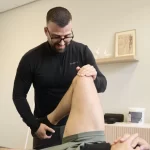Attitude
Posture is a fraught topic where many health professionals still have differences of opinion. Improving posture is often part of the treatment. It is also often identified as a reason for the emergence of complaints or injuries. Entire methods and treatment plans have been developed to improve this "wrong" posture. But is posture really the culprit? A lot of research has been released in recent years examining the role of posture in the development of symptoms.

There is no such thing as the perfect pose
There is no evidence that one attitude is better than another when it comes to the prevention of complaints. The best posture is the following posture. Adjusting your natural way of sitting is likely to cause more symptoms rather than less. It is especially important to alternate a lot of different postures whenever possible. So it's not about a particular posture not being good for you. The lack of movement can cause symptoms, though. Just hold a biro above your head for eight hours. In itself, nothing wrong with this posture but it will create a tired and annoying feeling in the shoulder belt. Now compare this one with your back or neck during a long day's work at the office. Nothing wrong with a certain sitting posture, but sitting for 8 hours straight becomes a problem.
A hollow or rounded back is not the reason for your symptoms
There is research where people are followed for a long time over time. This shows that people with a slightly different position of the spine, a concave or convex position of the back, do not develop more or fewer symptoms than a control group. A concave or convex stooth of your back is never directly the reason for your pains.
Attitude and self-confidence
An active, proud attitude is a booster for your self-confidence. A study conducted in America examined the role of attitude during simple arithmetic tests. Students who were anxious showed a hunched posture, and were less confident of a good outcome on this test. This hunched forward posture caused students to think less effectively. When asked to sit upright, they were more confident and scored better on the test. Posture not only affects how others think about us but also how you think about yourself! Self-confidence comes not only from thoughts about yourself but also from the attitude you adopt.
The best posture is a fine posture
A comfortable posture is very person-dependent. So don't try to teach yourself anything that doesn't feel natural. See what works for you.
Your back is not a fragile block box
Your spine is extremely strong and can be safely loaded at different angles and positions. Warnings to lift with a certain posture, for example, are unnecessary and can cause unnecessary anxiety.
Sitting is not the new smoking
Smoking and sitting are not even remotely similar. Clearly, lack of exercise does not bring benefits. But sitting has been unnecessarily demonised. Smoking is unhealthy, sitting is not!
It is easier to sit a lot these days. We pack the car a lot, have office functions and we easily plop down on the sofa in the evening too. There is no advice on a maximum sitting time. However, vsufficient movement easily compensate for prolonged sitting. So find a good balance. 150 minutes a week of moderate-intensity exercise is enough. You can always do more, but this is a good guideline to start with. This includes walking and cycling.
An attitude analysis makes no sense
Adjustments to your desk, for example, are unnecessary and do not prevent complaints. The advice to sit or lift in a certain way at work has no added value. The way you prefer to lift something or to sit is determined by the natural curvature of your own spine. So this is different for every person. Don't fall for this!

